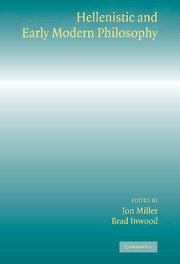Book contents
- Frontmatter
- Contents
- List of Abbreviations
- Notes on Contributors
- Preface
- Introduction
- 1 Stoicism in the Philosophical Tradition
- 2 Early Modern Uses of Hellenistic Philosophy
- 3 Locke's Offices
- 4 Patience sans Espérance: Leibniz's Critique of Stoicism
- 5 Epicureanism in Early Modern Philosophy
- 6 Stoics, Grotius, and Spinoza on Moral Deliberation
- 7 The Discourse on the Method and the Tradition of Intellectual Autobiography
- 8 Subjectivity, Ancient and Modern
- 9 Spinoza and Philo
- 10 Hume's Scepticism and Ancient Scepticisms
- 11 Stoic Naturalism in Butler
- Bibliography of Primary Sources
- Bibliography of Secondary Sources
- Index (general)
- Index (of selected text passages)
8 - Subjectivity, Ancient and Modern
The Cyrenaics, Sextus, and Descartes
Published online by Cambridge University Press: 05 August 2012
- Frontmatter
- Contents
- List of Abbreviations
- Notes on Contributors
- Preface
- Introduction
- 1 Stoicism in the Philosophical Tradition
- 2 Early Modern Uses of Hellenistic Philosophy
- 3 Locke's Offices
- 4 Patience sans Espérance: Leibniz's Critique of Stoicism
- 5 Epicureanism in Early Modern Philosophy
- 6 Stoics, Grotius, and Spinoza on Moral Deliberation
- 7 The Discourse on the Method and the Tradition of Intellectual Autobiography
- 8 Subjectivity, Ancient and Modern
- 9 Spinoza and Philo
- 10 Hume's Scepticism and Ancient Scepticisms
- 11 Stoic Naturalism in Butler
- Bibliography of Primary Sources
- Bibliography of Secondary Sources
- Index (general)
- Index (of selected text passages)
Summary
Introduction
In “Idealism and Greek Philosophy,” Myles Burnyeat asks two questions:
How did it come about that philosophy accepted the idea that truth can be obtained without going outside subjective experience?
When and why did philosophers first lay claim to knowledge of their own subjective states?
Burnyeat argues that “it is Descartes who holds the answers to [these two] questions.” The ancients, he alleges, do not view the subjective as a realm about which there are truths. Correspondingly, neither do they view it as a realm about which there is or might be knowledge; for knowledge (both in fact and according to the ancients) implies truth. Nor, Burnyeat argues, do the ancients view the subjective as a realm about which there are or could be beliefs. As he puts it in “Can the Skeptic Live His Skepticism?”:
Belief is the accepting of something as true. There can be no question of belief about appearance, as opposed to real existence, if statements recording how things appear cannot be described as true or false, only statements making claims as to how they really are.
In Meditation Two, by contrast, Descartes “discovers … the truth of statements describing the subjective states involved in the process of doubt itself”; “[s]ubjective truth has arrived to stay, constituting one's own experience as an object for description like any other.”
- Type
- Chapter
- Information
- Hellenistic and Early Modern Philosophy , pp. 192 - 231Publisher: Cambridge University PressPrint publication year: 2003
- 7
- Cited by

